
MORECAMBE WIN THE FA TROPHY AT WEMBLEY.
27th April 2024/27th April 1974 – Half a Century since Morecambe’s FA Trophy Victory.
I started this blog three years ago with a photo a Programme I bought exactly fifty years ago today to the date and the day. This was at the old Wembley (the stadium with the iconic Twin Towers) as Morecambe Football Club took what was – at the time – the greatest step for Shrimpkind imaginable. They were about to play at this venue against Southern League leaders Dartford in the FA Cup for non-league teams: the FA Trophy.
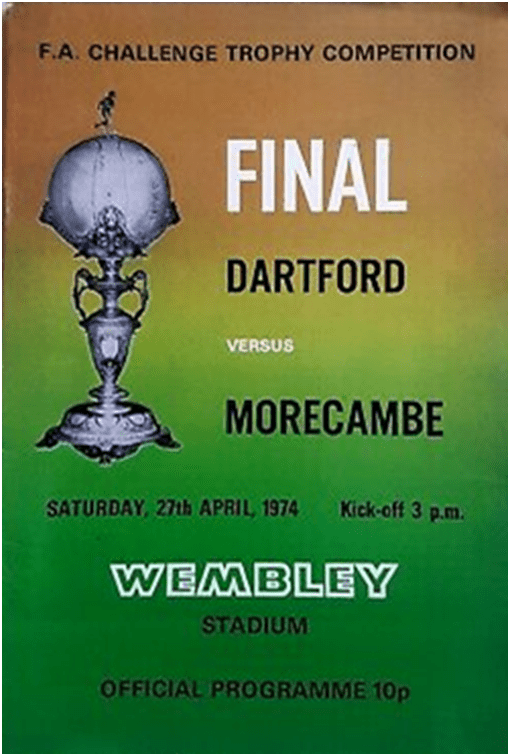
Last week, the surviving members of that team: Player/Manager Dave Roberts, Jimmy Sutton, goalkeeper John Coates, Dave `Mucker’ Pearson, Keith Galley, Geoff Street and Barry Kershaw all came together again to enjoy an Anniversary Dinner at the Mazuma Mobile Stadium. Before the loss against Forest Green Rovers in the Shrimps’ final home game of the League Two season, they lined-up on the pitch before kick-off to enjoy the acclaim of the four thousand plus crowd. My – how things have changed from when they plied their trade, week-in; week-out in the Northern Premier League in front of about five percent of this total at Christie Park.
I’m old enough to remember going to the old Wembley (for the first and only time) in 1974 to see Morecambe, managed by the aforementioned Dave Roberts, compete against a club I’d never previously known even existed. Back then, Dartford was just a crossing point over the Thames, wasn’t it? At the risk of boring Shrimps fans who are under the age of forty – or maybe fifty – what’s that? – ok; sixty if you must – here’s a quick history lesson to put this event into some sort of perspective..
1974. The newly-elected Labour Party government under Prime Minister “Darling” Harold Wilson had been in control as from February with a minority administration which they would increase to a three-seat majority after a further round of voting in October of the same year. Previous Tory leader Edward Heath was brought-down by a national Miners’ Strike which led to a Three Day Week where electricity from coal-powered power stations was severely rationed. This had a direct effect on Morecambe’s FA Trophy campaign. The electricity rationing included banning the use of floodlights at football grounds and the Shrimps’ Second Round tie against Bangor City was postponed twice before it was finally played in daylight at Christie Park – on a Sunday morning!

Elsewhere, the original Wimbledon FC was a member of the Southern League but Remember you’re a Womble – by Mike Batt and the Wombles – could be found in the top ten pop charts. (Seasons in the Sun by Terry Jacks was Number One.) And the top three in the album charts?: The Carpenters; Elton John and Paul McCartney’s Wings. Beer cost about 22 pence a pint; a large loaf of bread about fifteen pence; a pint of milk five pence. Average house price across the county? – around about nine thousand pounds. Average wage: just thirty-eight quid a week. The best-selling cars in Britain were both Fords: the Escort and the Cortina. The basic Cortina would have set you back just over £900 new; the top-of-the-range Escort Mark One RS2000 was just over £1500. (If you have one in good nick now; it will be worth at least fifty times this…) No satellite phones; no internet; just four TV channels; lots of tellies still black & white. The world was a very different place way back then.
In 1974, Morecambe FC was a member of the recently founded Northern Premier League. It was made-up of the best clubs north of the Midlands who were not allowed to play in the Football League: Wigan Athletic; Macclesfield and ourselves, for example, who have subsequently been able to play in the EFL once this bastion of the inadequate finally decided to let outsiders such as ourselves in as from 1987. Other clubs in the north – Altrincham off the top of my head – were also at least as good as many clubs in the old Fourth Division (League Two these days) – but couldn’t get a chance to prove it. Plenty more in the Midlands and the south were also easily good enough to play in the EFL as well: but they couldn’t either. Back then, though, this was the reality for football clubs all over the county and further afield (Bangor City immediately springs to mind). The good old English Football League – run by anonymous, grey men in suits from their little fiefdom of Lytham St Annes of all places – was Conservative in outlook and conservative by nature. It was a Closed Shop which didn’t welcome New Blood and preferred the Status Quo – however useless they might be – to anything – or anyone – who might replace the Dead Wood and actually improve the quality of league football by doing so.
So, with aspirations to become a Football League Club a total non-starter, what were we – as Morecambe supporters – left to hope for way back then?
The FA Trophy was basically as good as it got. If you could win this, you could bathe in the glorious belief that your club was the best in England for the next twelve months at least. Small comfort in relation to what our club has managed to achieve once the rules about EFL membership changed almost forty years ago, admittedly. But don’t knock it: only just over thirty clubs in total have won this precious trophy since it was instigated fifty-four years ago in 1970. By 1974, by definition, winning the thing meant that you were entering a very small and extremely exclusive club. To do so at all – then as now – is a tremendous achievement in itself for any non-league football club.
Let’s return to 1974 reality now.Forgive me as I reminisce. Fifty years ago, I was nineteen; living in the Bakers Arms (part of Leyton in east London) and working as a clerk – sorry; a `Higher Clerical Officer’ – in the NHS at the National Hospital in ever-so-agreeable Bloomsbury during the day. At night, I had dreams of becoming a professional bass player as a member of some rock band still to be discovered. Even after about six months of my five-year sojourn darn sarf, these dreams were already beginning to evaporate: I was just a small fish in a huge ocean in a city where actually getting any gigs to perform at (as opposed to bands to play in – that was the easy part) was really difficult.
Anyway, on the day of the game, I travelled to Wembley from the centre of the city by train to Wembley Central and walked up Wembley Way to the ground. My pals and I got there so early that we were given a guided tour of the stadium by probably bored security staff. I was surprised by how grotty the whole place looked – and smelled: `biggest public toilet in England’ I remember thinking at the time. But the one thing that really stuck in my mind was a little room deep in the interior with the word Mortuary written on the door. “We get up to three deaths from heart attacks at your average FA Cup Final” said one of the security men. Can this possibly be right?…
Forgetting that, though – who could believe it?: Morecambe at the biggest shrine English Football had to offer at the time! Only the previous season, I’d gone to see Morecambe play Wigan Athletic in the home leg of the F.A. Trophy Quarter-final at Christie Park. This has gone down in the annals of Trophy history as the best-attended game ever played in the known Universe other than Finals: and all I remember about it is that the ground was so full that I had to stand behind the South goal – something I hadn’t done since I was a kid. Oh – and that Morecambe eventually lost…
Anyway, back at Wembley, the ground was not even a fifth full – and most of the crowd were Dartford supporters. At the time, Morecambe were languishing near the bottom of the Northern Premier League but Dartford were right at the top of the Southern League (which would amalgamate, in time, with the Northern Premier to form the Alliance Premier League – the prototype of what became the Football Conference and what is now known as the National League). At the time, Dartford were the Bookies’ overwhelming favourites to win, as we shall see. Southern League clubs tended to have more money than their northern counterparts (what’s changed?) and I think I’m right in saying that the Southern League itself was generally regarded to be the strongest competition outside the EFL in England at the time. However, facts in the shape of clubs which had actually won the FA Trophy would suggest otherwise. The first-ever winners of the competition were our fellow-members of the Northern Premier League, Macclesfield Town in 1970. They beat Southern League Telford United 2-0. Telford then won it the following year but the third Trophy Final also saw a Northern Premier club beating a Southern League rival: Stafford Rangers easily saw-off Barnet by three goals to nil. The next Final was an all NPL affair, with Scarborough finally overcoming Wigan Athletic 2-1. But – despite this historical evidence not to count your chickens, the `experts’ were all expecting Dartford to beat Morecambe easily.

And even the matchday programme proclaimed them to be the “Best Non-League Club in England”.
So on the day, only one team was going to be victorious, wasn’t it?…
Morecambe lined-up in an all-red strip on the day. Apart from being surprised by this, my memory of the day – which I wrote down in a sort of Rock Band/Rock Gig/Football diary I kept at the time – was as follows:
`Without a shadow of a doubt, the greatest day of my football-supporting life. Who would have believed it just one year ago, standing virtually alone on the Christie Park terraces watching Morecambe being given a lesson in the soccer arts by a crappy Goole team, or three years ago at a freezing Mossley, that Morecambe could be at Wembley playing a Cup Final – and not in the Car Park either! The stadium was only one-fifth full, but there was a tremendous atmosphere, as we stood on the Morecambe terraces to the Royal Box’s right. Lots of pomp and ceremony to start off and then, away we went.
Morecambe, notably Coates (the goalkeeper) and Street (the Centre Half) were jittery at first and didn’t settle down until after the goals had come. It looked, at first, as if Dartford were getting a grip. They tended to play it tight and narrow generally, but had hardly anything of an attack – they just crammed midfield, which Morecambe bye-passed by attacking down the wings.
After about thirty minutes, following a few breakaways that surely must have shaken the Dartford defence into awareness of the situation, Sutton, as he did throughout the match, belted up the right wing after play had been confined to the left of centre and pulled the Dartford defence with it (they seemed incapable of thinking in anything other than straight lines), lobbed to Webber, who tapped it on to Richmond, unmarked, who belted it – via goalie and post – into the net… Pause for hysteria…
Before my eyes had stopped watering even, the Shrimps were off again down the wing and this time Sutton lobbed the ball over the goalie- a better goal no-one could ever see. So, that was that really – in 60 seconds the whole 90 minutes was settled.
Dartford could have got back into it about ten minutes later, when a shot beat Coates and hit the inside of the post – unlucky not to have gone in, but, in an exciting second half Morecambe were just as unlucky when Webber headed against the bar only to see the rebound hit the goalie and bounce back against the post and ultimately to safety. Dartford came back strongly and finally scored a goal. Long before the end, Morecambe were simply hanging on. Thank god the game isn’t played over 100 minutes Dartford got their goal with almost the last kick of the game, having threatened to do so for some time as the Morecambe pitch-exploiters visibly tired, but it was too late.
Then complete hysteria as the final whistle went and there followed the presentation and lap of honour. Marvellous, even though the real First Division violence from some Dartford idiots did throw a bad light momentarily on the proceedings. However, what a day…”
As I mentioned, our euphoria had the gloss taken off it by the reaction of a significant number of Dartford fans at the end. These thugs poured into the main Morecambe enclosure and beat up some poor souls badly enough for stretchers to be required. And as we walked back down Wembley Way, all we got from their black and white clad so-called `fans’ were lots of v-signs as they slunk home in their thousands on a seemingly endless supply of coaches.
Never to be heard of again.
Tee hee – Dartford these days is just a tunnel, isn’t it?
Once the medal and Trophy presentations had been made and Morecambe did their victorious Lap of Honour, I returned to the centre of the capital. I clearly remember turning off Euston Road about an hour after the Wembley game outside the West Coast Rail terminus with my partners in crime of the time. We were just about to enter a pub when the Arsenal Special disgorged its contents back into the capital, presumably after playing somewhere in the Midlands. As it did so, a tidal wave of noise and hooligans dressed in red and white were sweeping towards us at a rate of knots down the station steps.
I still remember the horror I felt as someone grabbed me from behind as I disappeared into the pub. I turned round to be confronted by a posse of what we now call Gooners (wouldn’t have been a good idea then, I suspect – at least, not to their faces…)
Why had they picked on me?
Because I was wearing a red and white rosette.
Thank god Morecambe don’t play in blue and white because if they had, I’d probably have ended up in the local A & E. But because Morecambe and Arsenal both wear red and white, the Gooners were as delighted as we were – and even bought us a drink to celebrate…
Anyway – enough reminiscing. Is it time for a proper match report now? I think it is.
In his peerless book simply entitled The FA Trophy, Paul Eade describes the final thus:
“Two brilliant goals in the space of two minutes sealed FA Trophy glory for Morecambe at the expense of odds-on favourites Dartford. Dartford were 4-7 with the bookies to take the trophy as they won the Southern League by 8 clear points, while Morecambe were seventeenth in the Northern Premier League. But, once again,, it was the southern-based team that went home disappointed.
After a steady first twenty minutes, in which both sides showed their willingness to attack, the game suddenly moved into top gear. Morecambe striker Tony Webber latched onto a long clearance, progressed down the right and crossed the ball along the ground for Malcolm Richmond, whose shot struck Dartford keeper John Morton’s body but still went into the net. The Morecambe fans’ jubilation had not even subsided before Morecambe were two up. Again Webber picked up the ball on the right, this time trying a shot himself that struck Dartford defender Graham Carr and fell to Jimmy Sutton, who shot accurately and strongly into the roof of the net.
Morecambe’s supporters were soon chanting `we want three’, and Webber almost obliged with a shot that Morton saved at the foot of the post. Dartford were in disarray, especially defending the flanks, where Webber was having a field day. But, on forty minutes, Dartford went agonisingly close to pulling one back, Keith Robinson’s shot hitting the upright. This seemed to give Dartford the impetus they had previously lacked and just before half-time Morecambe player manager Dave Roberts cleared off the line, following a Ken Halliday cross.
But Morecambe regained their composure after the interval and Morton was soon at full stretch to once again stop a Webber shot in the shadow of the post. Roberts was a constant thorn in Dartford’s side and he won a corner that put Dartford’s defence in a tangle, before Morton eventually gathered.
As time wore on Dartford had to commit to attack and it looked as if the game would soon slip further away from them as Morecambe exploited their increased space to roam the Wembley turf. Webber again set himself up for a shot that beat Morton but, to the Man of the Match’s disbelief, the ball struck the bar before Richmond was narrowly unable to capitalise on the rebound.
Dartford refused to give up and Morecambe began to visibly tire, with eighteen-year-old Keith Galley coming on for Roberts, who was suffering from cramp. Galley was far from overawed and embarked on several probing runs with the ball but Dartford began to enjoy more possession.
In the last ten minutes, it was all Dartford, with Morecambe ‘keeper John Coates the busiest man on the pitch, but it was not until injury time that Dartford got a goal, Dave Cunningham finding enough space in the box to drive the ball home from a point near the penalty spot. Dartford urgently placed the ball back on the centre spot, but Morecambe managed to close out the last few seconds in the middle of the park before the final whistle signalled a mini pitch invasion from a section of Morecambe’s younger supporters.
Roberts, a member of the Macclesfield team that won the FA Trophy in 1970, had passed on to his side a confidence that the trophy would be theirs. Even after Morecambe had won at Mexborough in the first round, he told the local press that that the Shrimps were on their way to Wembley. After Morecambe triumphed, he explained:
“I had no doubts we would win the trophy. Just because we are lowly placed in the Northern Premier League does not mean we are a bad side… Our fourteen-man pool was ideal for a good cup run and I was so glad we played Dartford in the final. Our league champions Boston might have beaten us but I do not think the Southern League teams rate as highly and our victory confirms northern superiority in non-League soccer… I told the lads at half-time not to relax. We had played them off the park but could not afford to relax our grip. We didn’t and Dartford had no real chance of making a fightback.””
The current Morecambe FC website dismisses the 1974 win in a single sentence. But Paul Eade records what the club had to say about it twenty years ago when the Shrimps were still a non-league team and the victory still rated as its greatest ever achievement:
“Saturday 27 April 1974 is a date forever embroidered in the rich tapestry that is Morecambe’s history. A 2-1 victory over Dartford, with goals by Malcolm Richmond and Jimmy Sutton, with over 9,000 Shrimps supporters in the crowd of over 19,000, is the merest of the recorded statistics. However, the day belonged to Morecambe, in what was arguably the club’s finest hour.
The path to Wembley was a difficult and traumatic one. After a comfortable 3-0 victory at Mexborough, old rivals Bangor City were overcome 2-1 at Christie Park. Kettering Town, with Ron Atkinson, came to Christie Park and held the Shrimps to a 0-0 draw. Kettering, giants of the non-League world at that time, felt – and said as much in the press – that the job was done, that victory for the Poppies at Rockingham Road was a foregone conclusion. Somebody forgot to tell Morecambe, who put on a magnificent display, winning the game 2-1. Tony Webber, a schoolteacher, who scored the two goals, taught Kettering an important lesson that night: never count your chickens.”
This was the way the Shrimps actually progressed to be FA Trophy Winners in 1974:
First Round: Mexborough 0:3 Morecambe.
Second Round: Morecambe 2:1 Bangor City.
Third Round: Morecambe 0:0 Kettering Town.
Third Round Replay: Kettering Town 1:2 Morecambe.
Fourth Round: Bedford Town 0:1 Morecambe. (This game has gone down in the annals of football history in that it is reputed to have featured the very first streaker ever to have been spotted at an English football ground.)
Semi-final First Leg: South Shields 0:2 Morecambe
Semi-final Second Leg: Morecambe 1:0 South Shields.
Final; Wembley Stadium, 27th April 1974: Morecambe 2-1 Dartford.
And this was the team which Dave Roberts chose to play at Wembley:
John Coates (Goalkeeper), Dave Pearson, John Bennett, Jimmy Sutton, Geoff Street, Bob Baldwin (Captain), Steve Done, Tony Webber, Dave Roberts (Player-Manager), Barrie Kershaw and Malcolm Richmond. Substitute: Keith Galley.
But what more do we know about these men who would become legends of Morecambe football club once the match on April 27th 1974 was over? This is what I have been able to glean from my own memory and sources I have been able to unearth which record the event. The individual yellow panels are from Morecambe’s local paper – the Visitor of 24th April 1974: a colour section in a monochrome publication was very unusual way back then and showed the importance which was being attributed to the forthcoming match in the town generally.
1. Goalkeeper John Coates. John Albert Coates was born in Birkdale (near Southport) on 3rd June 1944. He had been on the books of then Football League clubs Southport and Chester but was plying his trade in the non-leagues when Morecambe signed him from Kirby Town in 1972.
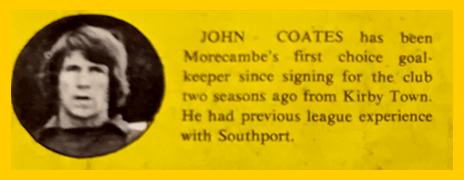
He played again for Morecambe briefly after being released in 1975. John is still with us and still very much recognisable – the Jeff Beck-like hairstyle in itself enough to make most of us baldies who are actually younger than he is totally green with envy! The description of John in the Wembley programme on the day doesn’t tell us what he did for a living other than being a part-time professional footballer. As we go down the list of players, you will note that it did so for everybody else. Yes – even the `Player-Manager; wasn’t full time: he spent the rest of it trying to flog people stuff to do with catering. (Belated thought- as the buying clerk in the Catering Department of the National Hospital, maybe we could have done a deal… Too late now…)
2. Dave “Mucker” Pearson. What were generally called `Pen Pictures’ at the time (descriptions of the players) in the Wembley Final programme tells us:
“Fast, strong-tackling full-back, he signed for the club in 1971 from Rochdale. A good user of the ball, he had played 300 consecutive cup and League games for Morecambe before a suspension in January. Formerly with Everton and Southport, he gained Welsh Schoolboy and under-23 honours. Motor mechanic.”
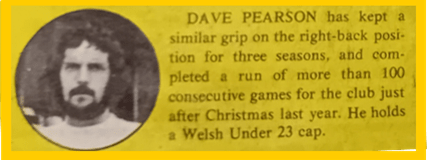
The Light at the end of the Tunnel by Lawrence Bland and Derek Quinn tells us that Dave Pearson wasn’t really Dave Pearson at all. He was actually christened `Aubrey’. If I had been named Aubrey, I would have changed it too. Because at the very tolerant and progressive Catholic alleged `Comprehensive’ I attended back in the 1960s, anyone with a namby-pamby name like Aubrey would immediately have been identified as potentially homosexual and given the very special treatment reserved for such people – sorry – `Abominations before the Lord’ to use the official parlance of the clergy there. From Aubrey to Mucker is quite a stretch, isn’t it? – I’ll leave it up to you to imagine why he acquired this particular nickname. He left the club in 1976 and subsequently played for South Liverpool, Chorley, Burscough and Chorley.
3. John Bennett. The Cup Final programme wrote this about John:
“A hamstring injury kept him out of football last year and he joined Morecambe at the start of this season. A dedicated full-back, he was a full-time professional at Liverpool, and won a Challenge Trophy medal with Macclesfield in 1970. Self-employed joiner.”
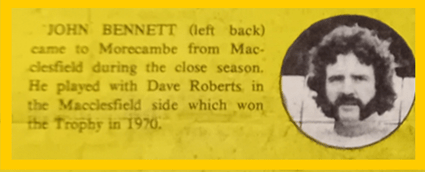
John left the Shrimps in April 1975 to play for Stalybridge Celtic.
I’m afraid I have nothing further to add about John, despite my best endeavours
4 Jimmy Sutton. Here is Jimmy’s Cup Final Pen picture:
“The only Scot in the team. Once with Newcastle United, he joined Morecambe from Mansfield and has established himself as a good attacking midfield player. Works for the Inland Revenue.”

James Peter Sutton was a Glaswegian but played exclusively for English clubs. He left the Shrimps in May 1976 to become Player/Manager at (Blackpool) Wren Rovers. He later held the same position at Lytham before returning to the Wrens, presumably to make sure all their books were in order.
Peter Jones was the Welsh Football Correspondent of the BBC at the time. But Peter Kenny Jones writes articles for Port Vale’s matchday magazine. He wrote a review of Morecambe and their path to the 1974 Final for the League Two game against the Shrimps at Vale Park on Saturday, 16th April 2019. This is what he wrote about Jimmy:

“Jimmy Sutton helped to ensure that the dreams of all Morecambe fans in the stadium came true when he scored the second and vital goal. Sutton ran straight to reserve team manager Sean Gallagher following his goal, recognising that it was him who had given him the chance to impress and gain a place in the team for the day.”
5. Geoff Street. The Cup Final programme tells us:
“Started his career with Manchester City and played for Barrow, Southport and Boston United before joining Morecambe. A centre-half who is commanding in the air and fearless in the tackle. Insurance agent.”

Being a Centre-Half was probably as good as it gets for selling Personal Injury Insurance to opposing Centre Forwards, when you come to think of it. Geoff was what was euphemistically once called an `uncompromising’ defender. He stood out in all the Morecambe teams he played for not only because of his size but also because of his clear ability: he was another part-time professional who could certainly have cut it at a higher level. My abiding personal memory of Geoff Street was in some nondescript match at the beginning of some forgotten season in the 1970s. At Christie Park – and in front of perhaps 200 other sad people like myself with nothing better to do – he was marshalling the home defence and put his arm up – in classic Tony Adams’ style – to claim for the classic Arsenal Off-Side trap to the Referee. Geoff must have played cricket during the summer because he automatically shouted “’Owzat?” And – right on cue – the Usual Suspects in the crowd yelled back at him: “Not Out!” It was a moment of genuine hilarity in an otherwise completely forgettable game. Geoff played for the club for ten years, clocking-up 437 appearances and scoring 28 goals. The Mancunian moved to Lancaster City in December 1980 but has maintained his contacts with our club, working with the Hospitality staff within the stadium in recent times. Peter Kenny Jones writes about Geoff:
“One man who had a pivotal part to play in the victory was Geoff Street who played as centre-back for the famous game. Street was part of a team that was a far cry from the glamour of the Globe Arena today. He recalled times where he would have to go around the ground with a bucket to raise funds to buy the players’ tracksuits.
This underfunded team were soon to deliver great riches for the club. Street missed the 3rd round tie against Kettering due to an injured shin. The injury was severe enough that he missed the subsequent replay and then the 4th round victory over Bedford Town. The Morecambe side were unfavoured for both ties but repeatedly showed their fighting spirit to keep progressing through the competition. He was a major doubt for the semi-final, but Dave Roberts was bold enough to start him against Gateshead, meaning that he also took himself out of the team. Roberts’ decision was a master stroke as Street scored the only goal of game, setting up a nervy second leg at Christie Park. The (Shrimps) were 2-0 winners and had earned themselves a place in the FA Trophy final.
Street was part of a famous team that delivered on the biggest stage. The squad from that day will always be remembered in the annals of Morecambe history and they deserve all the love and gratitude they have, and will continue to, receive.
Morecambe held out despite a late Dartford consolation and the game was won, players and fans united in celebration. However, whilst the squad were celebrating Street was on the deck with cramp. Everyone was too happy to realise he was floored and began climbing the Wembley steps for the trophy. Still retrieving treatment, he had to watch as all his teammates received medals and lifted the trophy. By time he had got to his feet the team were halfway round their lap of honour, Street quickly hobbled to catch up and finally join in the celebrations.”
Speaking ten years ago, Geoff told our own Derek Quinn:
“We also had a superstition that we would see a wedding on the way there – which is not unusual on a Saturday morning. If we saw one, it was always a good sign for us. I think we were all playing well at the time. I’d been at Morecambe a couple of years and I was probably at my peak – and I think a lot of the other players were as well. Bob (Baldwin) usually says that I was the person who prolonged his career by a couple of seasons because I think I was just young and wanted to win the ball as much as I could and I think they just gave me my head and I used to win the ball and Bob used to sweep-up behind me – and it worked.”
On the day, he continued:
“The walk-out took for ages; in fact, one or two people ran out of film in their cameras because they took them all as we were walking out. The game itself – I can’t remember anything! All I was concerned about was not letting them score. That kind of excitement takes you in different ways. Some of the lads played up to the crowd; were enjoying it. I think one or two of the others were remembering – you know – parents or whoever it might be. In my case, my dad used to help me out an awful lot when I was a kid and he wasn’t there – and he’d have been proud to be there; it was just an emotional time for me in that respect.“
6. Captain Bob Baldwin. Here is how Bob was introduced in the Final programme:
“At 34, he is the senior member of the team and Morecambe’s captain. Reads the game well and acts as strong-tackling sweeper. Played as a youth for Preston North End. Aircraft fitter.”

Successful previous Morecambe Manager Ken Waterhouse made Bob his very first signing when he paid Fleetwood (then also a non-league club) a whole ninety quid for his services during August 1967. He played over four hundred matches for the Shrimps before leaving to become Manager of his Works Team at BAC Preston in April, 1976. Bob was actually older than Player-Manager Dave Roberts when they played together for Morecambe but was still trusted by Dave to lead the team on the field. He did this partly by example: Bob was one of those players who never gave up the fight, whatever the circumstances.
Sadly, Bob’s son Sean was obliged to make the following announcement on social media in January 2021:
“After nine days of solid defending, Covid-19 has been the only opposing player who dad couldn’t chop down, at the knees, with a two-footed challenge.”
The club’s website published an obituary including these words:
“The club is saddened to hear about the death of former skipper Bob Baldwin. Bob was a club legend who was captain of the FA Trophy winning side of 1974. Co-Chairman, Rod Taylor, paid his personal tribute saying: “Bob was a hard-tackling defender on the pitch and a gentleman off it. He had a nine-year career at Christie Park with, for me, the 1967-68 season standing out as a season and a team that evokes particularly wonderful memories. The FA Trophy win at Wembley Stadium in May 1974, with Bob as captain accepting the trophy from Sir Stanley Rous in the Royal Box, was also a memory all Shrimps’ fans will remember. Bob and Geoff Street were a fantastic central defensive pair.” The thoughts of everyone at the club are with Bob’s family. RIP Bob, a true Shrimps legend.”
7. Steve Done. The Cup Final programme notes talked-up Steve’s impact on the game in the north of England – and deservedly so:
“Regarded as one of the most skilful midfield men in the Northern Premier League. Left Burnley to join Morecambe during 1968-69 season because, being a schoolteacher, he could not dedicate enough time to being a full-time professional.”
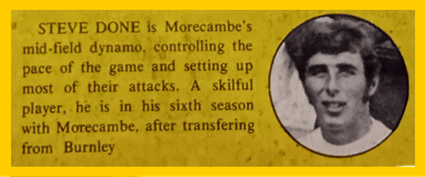
Steve Done played inside right as well as right half for Morecambe during his exceptionally long career with the club. He was one of those players who should have been playing at a higher level. In those days, though, many Non-League players were good enough to make the grade. The reason that they didn’t is because they weren’t prepared to give up their day-time jobs and concentrate purely on football.
The Morecambe v Hull City programme for the F.A. Cup First Round of 16th November 1992 – of which I have a copy; having attended the game – has a profile of Steve Done in it. It says he joined Morecambe from Burnley, aged 19 in 1968 `wishing to remain part-time so as to continue his teaching job’. It also says that he played a record number of times – 392 plus various abandoned games or ones he was sub but didn’t play – over ten whole seasons at Christie Park. I remember him as a really classy player who always seemed to have time on the ball; who read the game brilliantly and could play the sort of killer passes that most forwards can only dream about receiving. Steve is also sadly no longer with us. I’ve been unable to find out anything further about him except that – amazingly enough – Morecambe’s holder of the greatest number of club appearances does not merit even a mention in the alphabetical list of former Shrimps’ players on Wikipedia.
8. Tony Webber. This is what the Cup Final Programme of 1974 had to say about him:
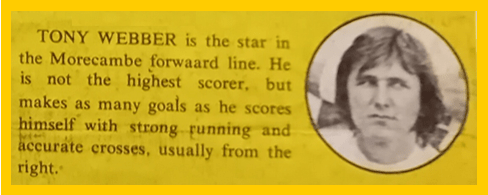
“He and Bob Baldwin are the only members of the side to cost the club money – Morecambe paid Skelmersdale United £250 for him at the start of the season. On his day, a matchwinning striker with a strong shot and great pace. Schoolteacher.”
Regrettably, Tony is no longer with us either. This posting appeared on the Morecambe FC website on 28th December 2021:
“Morecambe Football Club is saddened to hear of the death of former player Tony Webber, who was a member of the Shrimps’ FA Trophy winning side back in 1974.
A Wigan-born schoolteacher, Tony was released by Bolton Wanderers and joined Skelmersdale United, before joining the Shrimps for £250 in the summer of 1973 to replace Russ Perkins.
He scored on his debut in a 4-1 win against Buxton on August 11 and went on to become a regular in the FA Trophy winning side, scoring two goals in the superb replay win at Kettering on the way to the Final.
He carved his name into Morecambe folklore with a superb performance in the FA Trophy triumph, setting up the goals for Mal Richmond and Jimmy Sutton and being described as a ‘lethal striker’ in the People’s report of the match.
Tony finished the 1974/75 season as top-scorer with 22 goals and repeated the feat in the 1975/76 campaign with 29 goals. Which included scoring four times in consecutive games – a 5-3 win at Radcliffe Borough in the Lancashire Junior Cup and in a 5-2 FA Trophy success at Crook Town.
His last game for the Club was on October 5, 1976 when he was a substitute in a 1-0 home defeat by Great Harwood, before being transferred to Altrincham for a fee approaching £1,000.
He went on to play for Lancaster City before managing several clubs including Rossendale United, South Liverpool and Horwich RMI.
Co-chairman, Rod Taylor, said: “I am saddened to hear of Tony’s death. He was a prolific goal-scorer for the Shrimps in the mid 1970s and led the club’s goal scoring charts for two seasons.
“The stand-out memory for me is his brilliant performance at Wembley Stadium in the 1974 FA Trophy Final, setting up Morecambe’s two goals. I would like to pass on my condolences to Tony’s family.”
Steve Done, a former team-mate, added: “He was a great goalscorer and really well liked. He was a very outgoing, quick-witted and intelligent lad. We always kept in-touch and a few of us still played golf regularly until recently. We will really miss him.”
9. Player/Manager Dave Roberts. The programme didn’t make any special mention of Dave other than describing him as `Mr’ Dave Roberts. It listed him along with the other players on the day and said:
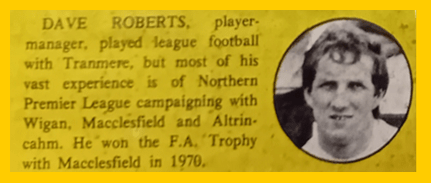
Morecambe’s player-manager is a good all-round midfield player, who motivates the side with his great enthusiasm. Played at Wembley with Macclesfield in 1970 after spells with Liverpool, Tranmere, Wigan Athletic and Altrincham. Salesman in the catering trade.”
I remember Dave as a rough, biggish blonde player who certainly led by example and pulled no punches – in more ways than one. It must have been odd – as the Manager – to play Second Fiddle in the team which actually performed on the pitch: someone else (usually veteran Bob Baldwin) was the Elder Statesman and also Skipper on the field. It’s also a sobering thought that being the Manager of a leading non-league club in the north of England wasn’t enough to pay the bills and that Dave had to also earn his crust as a Catering rep at the time. My, how things have changed at the club these days…
However, Dave had always been pragmatic as the Player/Manager of the club. As Peter Jones has told us, he was even prepared to drop himself from the team if he felt that someone else – Geoff Street, for example – could do a better job. Jones adds:
“Roberts had experience too of winning the trophy, but the rest of the squad were in uncharted territory and the travel down to Wembley left many of the squad awestruck. Street and the rest of the players were delighted with the opportunity to train at Hyde Park before the game and stay in the Royal Lancaster Hotel, no doubt the highlight of many careers.”
10. Barrie Kershaw. Barrie’s Pen Picture in the Final programme reads:
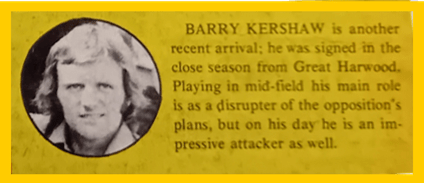
“Has played in practically every position and is probably best suited to the role of striker, in which he can make use of an explosive left foot and his considerable ability in the air. Joined Morecambe at the start of the season from Great Harwood. Joiner.”
More than that, I’m afraid I do not know.
11. Malcolm Richmond. The matchday programme tells us:
“Had the misfortune to break a leg twice in the last two seasons, but has recovered well and is a most dangerous striker. A great taker of half-chances. Another schoolteacher.”
Peter Jones adds:

“Malcolm Richmond put the Shrimps ahead after he scored the first goal, this was a fantastic thrill for him and all the supporters in the ground. What made it even sweeter was a telegram that he received after the game from his parents that read ‘Boyhood dreams DO come true!’
I’m afraid that Malcolm is no longer with us either. The club’s website announced in August 2019:
“THE club is sorry to hear about the death of former player Malcolm Richmond.
Malcolm wrote his way into the club record books when he was one of the goalscorers’ in the Shrimps’ 2-1 victory over Dartford in the FA Trophy final at Wembley in 1974.
Born in Blackpool, Malcolm came to teach in Lancaster in September 1970 after a course at Carnegie College in Leeds, signing professional forms for the club.
Described at the time as ‘a most dangerous striker’, he finished as leading goal scorer in 1971-72, but suffered a broken leg in the final game at Ellesmere Port.
He then suffered another broken leg in his only first team game during 1972-73.
Thankfully he made a comeback in October 1973 and led the team to Wembley success in the F.A. Trophy, scoring the first goal.
He was released in April 1975, moving to Skelmersdale United in 1975-76. He later played for Horwich RMI in 1976-77 and Chorley in 1977-78 and later coached Horwich RMI in 1986-91.
Overall Malcolm made 160 league and cup appearances for the Shrimps scoring 73 goals.
Club co-chairman, Rod Taylor, passed on his condolences to Malcolm’s family, saying: “Malcolm will always be a true Morecambe legend who brought joy to many a Shrimps’ fans with his famous goal at Wembley. He played a huge part in the club’s FA Trophy winning season scoring four valuable goals in the competition. All the Morecambe Football family send our condolences to Malcolm’s family & friends.’’
Substitute: (Only one was allowed in those far away times): Keith Galley. This is what the Final programme had to say about him:
“Highly-promising 18-year-old-striker who has merited the attention of several top clubs. A local lad, he has come up through the club’s youth scheme and his speed and ability in the air and dribbling skills have made him Morecambe’s top scorer.”

Keith himself summed-up his experience as a Shrimps player who lifted the FA Trophy at Wembley in these words:
“It all started for me at Morecambe in 1973 and I first managed to get into the first team after Alan Taylor left to join Rochdale before his move to West Ham. I did pretty well in that spell, including being involved in the FA Trophy win over Dartford at Wembley in 1974. It was a great day and I remember the whole party going out on the Friday and seeing Cliff Richard in concert and meeting him afterwards and training near to our hotel in Hyde Park on the Saturday morning. I had played a few games in the Trophy run but was only named as a substitute for the game itself. I was obviously disappointed to lose my place on the day, but Mal Richmond came in and scored one of our goals so in the end it was probably a good decision by the manager David Roberts.

I did manage to get 25 minutes though. I remember beating their right-back a few times but although I was only young at the time, I was shattered! The Wembley pitch was great but it was really spongy and took it out of you – but to say I have played at Wembley is something special. We had a special team to be honest. We may have been non-league, but we had some cracking players. Many of them could have played at a higher level but they had good jobs and chose to combine the two like Mal Richmond.

I always remember the captain Bob Baldwin. He hardly spoke but get him on a football field and he would take no prisoners and was a great midfielder. I was the youngest player by quite a way and the lads never let me forget it! They liked having a laugh at my expense but they also looked after me on and off the pitch and really helped me develop as a player too.’’
So there we have it: twelve men who will forever hold a huge part in the history of Morecambe Football Club. Shrimps? – they were Giants on the day. Well done to all of them.
Here are a few Black & White images of press cuttings of the time and the reception the players received during their open top bus ride through the resort afterwards. (Note the plug for Morecambe Illuminations on the front of the bus. My, it was a long time ago…)


This is a photo of the team outside Morecambe Town Hall after the Open Top bus ride round the town following the famous victory. The man on the left is legendary Shrimps centre-half from their Lancashire Combination days, Gerry Irving – now sadly also no longer with us. He was the team’s trainer when they were successful at Wembley.

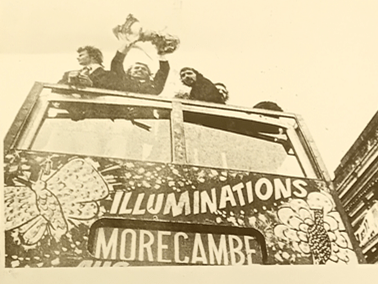
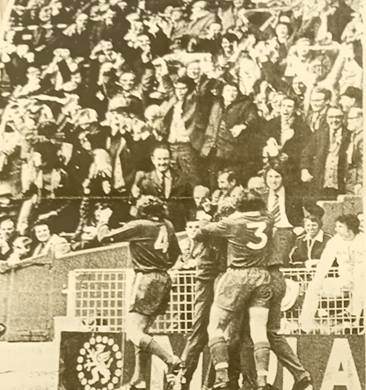

This is how the victorious team pictured in the photos above appeared in the Morecambe Guardian photograph used in the matchday programme:
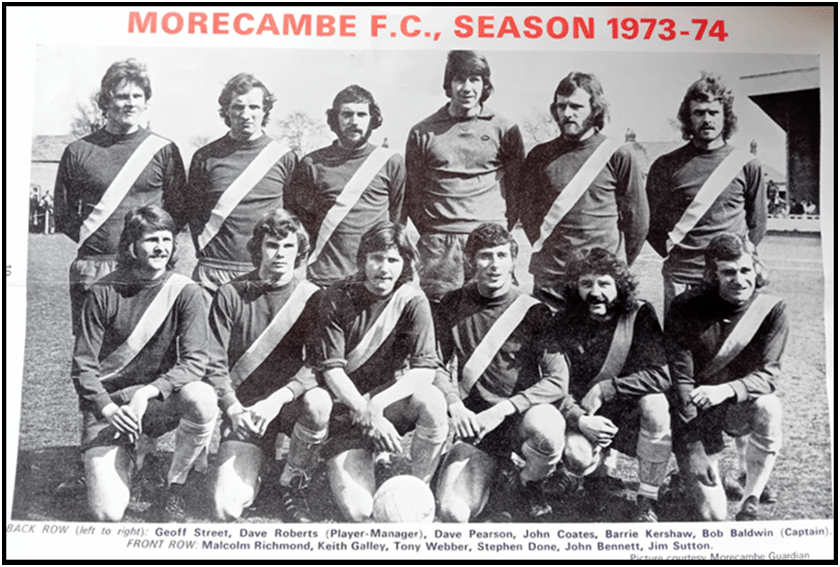
And this is how the surviving members of this team – Dave Roberts, Tony Webber, John Coates, Dave Pearson, Geoff Street, John Bennett, Jimmy Sutton, Barrie Kershaw and Keith Galley – looked when captured at the Anniversary Dinner at the Mazuma Mobile Stadium a week ago. See how many of them you can recognise.

If you have any further memories; photographs or anything else you would like to share with us – particularly if you are one of the players – please add them to the Shrimpsvoices or Facebook posting where you probably saw the link to this article. Alternatively, you can send them to me directly at
shrimplythebest@myyhoo.com
All contributions will be greatly appreciated. I will include everything of general interest in an updated version of this article in due course – and if you contribute, you will get a mention!